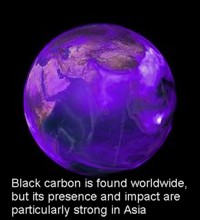Black carbon -- The silent killer

It’s a major contributor to global warming; it is causing
glaciers to melt; and it kills over a million people a year. It’s
also something that can be virtually eliminated by existing
inexpensive technologies. What’s wrong with this picture?
GLOBE-Net - Black carbon -
tiny particulate of soot created from the incomplete combustion of
diesel fuels, cook stoves, some industrial processes, and from
agricultural and forest burning. It can cause serious health issues
and is a leading cause of childhood deaths in the developing
world.
Helping developing nations eliminate black carbon would be quick
and easy, argued numerous scientists and experts that appeared
before the U.S. House Select Committee on Energy Independence and
Global Warming, last week.
“Black carbon packs a powerful punch when it comes to climate
change, absorbing solar radiation while in the atmosphere and also
darkening the surfaces of snow and ice, contributing to increased
melting in vulnerable regions such as the Arctic and Himalayas,”
said Durwood Zaelke, president of the Institute for Governance and
Sustainable Development (IGSD), in a
release from the IGSD.
One of the problems caused by the air borne
particulate, is the effect is has on snow and ice. When black
carbon settles on glaciers or ice caps it acts as a catalyst,
accelerating the melting rate. Black carbon absorbs heat, so it
warms the atmosphere and melts snow faster if it settles on it.
Scientists are concerned for large glacial areas, like the
Himalayas and Tibetan Plateau, because an increase in melting could
create floods and monsoons in the areas that these glacial deposits
feed.
IGSD director, Zaelke, stated that black carbon can be dealt
with easily through existing technologies, and getting soot out of
the way early on will give scientists more time to deal with CO2 in
the atmosphere.
He told legislators that developing countries such as India,
where respiratory illness is the fourth leading cause of death, and
China would benefit the most from the widespread use of simple
technologies that can deal effectively with black carbon.
According to World Health Organization estimates, black carbon’s
impact on public health is profound: 1.5 million lives are lost to
respiratory, heart and other soot-related harm every year.
Diesel-particulate filters for vehicles can reduce around 90 per
cent of black carbon emissions on their own, and clean burning cook
stoves are easy to supply. Both would have a large impact, says the
IGSD.
“We already have the technologies needed to achieve deep
reductions,” said Congressman Edward Markey, who chaired the
meeting. “Developing and installing technologies would create jobs
and move us forward in the clean energy economy.”
“Policy-makers are beginning to take note of black carbon and other
short-term climate forcers,” said Zaelke. “These “fast-action”
strategies are the low-hanging fruit that need to be picked now to
avoid the dangerous near-term consequences of abrupt climate
change.”
More information on black carbon can be found here:
target=”_blank”>http://en.wikipedia.org/wiki/Black_carbon
Kyle Vinoly is a journalism student from Kwantlen
Polytecnique in Vancouver, serving as a GLOBE-Net Intern.
You can return to the main Market News page, or press the Back button on your browser.

